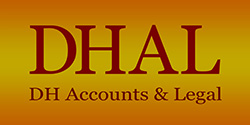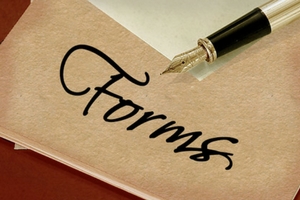Articles
Get Our Newsletters
Get our news, articles, offers, videos for free and find tips in business, accounting, tax and legal for your successful business!
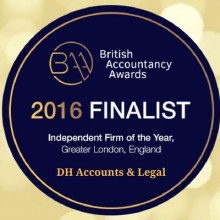
The Finalist in The British Accountancy Awards 2016
We are delighted to announce that DH Accounts & Legal Ltd is nominated as a finalist in The British Accountancy Awards 2016 under category Independent Firm of the Year Greater London, England. The Awards are regarded as the industry’s most prestigious accolades. They pinpoint professional development and highlight those that have demonstrated excellence in their profession during the last 12 months. The glittering event to celebrate the very best in accountancy will take place on 29th November in the premier event and fine dining venue The Brewery in the City of London. This is our second year in the row to attend The British Accountancy Awards. TweetEmail

Business finance: Funds without a bank loan
Are you looking for alternative sources of finance for starting or growing a business? There are three options we can offer: Business loans Crowdfunding Grants Why to get extra funding? Extra funds helps to: increase your sales maintain your profitability improve your cash-flow develop your products and services grow your business If you are interested in funding fill out a form and our business consultant will contact you. Business Finance Form Follow us on Facebook to find more tips in business, accounting, tax and legal. Also you can get our articles for free directly to your email inbox. Please sign up form below. TweetEmail
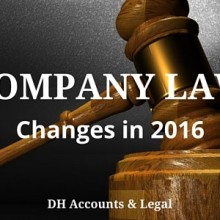
UK Company Law: Changes in 2016
This year Companies House introduces some important changes to UK company law. We have provided some of the key changes and the proposed implementation dates. New accounting regulations for companies - January 2016 The regulations apply to accounting periods beginning on or after 1 January 2016. The key change in these regulations is the removal of the ability for a small or medium-sized company to file abbreviated accounts at Companies House (although the very smallest companies can prepare micro entity accounts). New accounting standards - January 2016 The Financial Reporting Council (FRC) have revised the accounting standards under which UK companies prepare their accounts. More information about this change can be found on the FRC website. Some of the main changes: a new statement is required to be delivered in a set of small company abridged accounts to indicate the members have agreed to the abridgement the thresholds for a company size have changed. For a small company the turnover limit rises from £6.5m to £10.2m and balance sheet total limit rises from £3.26m to £5.1m. The total number of employees remains at a maximum of 50 for a medium-sized company the turnover limit rises from £25.9m to £36m and the balance sheet total limit rises from £12.9m to £18m. The total number of employees remains at a maximum of 250 Register of People with significant control (PSC) - April 2016 Companies, LLPs and SEs need to keep a register of people with significant control (‘PSC register’) from 6 April 2016. A PSC is anyone in a company, LLP or SE who meets one or more of the conditions listed in the legislation. This is someone who: owns more than 25% of the company’s shares holds more than 25% of the company’s voting rights holds the right to appoint or remove the majority of directors has the right to, or actually exercises significant influence or control Confirmation statement replaces the annual return - June 2016 The annual return is being replaced by confirmation statement from 30 June 2016. The confirmation statement is intended to serve roughly the same purpose as the annual return: for companies to provide up-to-date information for inclusion on the public register. However, one main difference is that you need to check and confirm the company information held is accurate. Another notable difference is that in your first confirmation statement you’ll also need to include the information held in your people with significant control (PSC) register. Statement of capital changes - June 2016 Statement of capital will be simplified from 30 June 2016. The changes remove the requirement to show the amount paid up and unpaid on each share. Instead, you now need to show the aggregate amount unpaid on the total number of shares. You will only need to provide a full statement of capital where changes have been made during the year. Changes to Companies House fees – June 2016 Companies House some fees including registration and search are changing from 30 June 2016. Corporate directors - October 2016 It’s expected that from October 2016, you won’t be able to appoint corporate directors (although there are some limited exceptions). All company directors will have to be ‘natural persons’. More information you can find on the Companies House website. If you have any questions you can contact our experienced business consultant. We help to set up, run and develop businesses in UK. Also we have special service packages for companies. Contact us and we will send you our offers to your email. Contact Us Follow us on Facebook to find more tips in business, accounting, tax and legal. Also you can get our articles for free directly to your email inbox. Please sign up form below. TweetEmail

Brexit: What next?
On Thursday 23 June 2016 the UK public has voted to leave the EU and nowadays it’s a hot topic across the world in newspaper, on tv, radio, social media. For many people this is not an easy situation which may rise lots of emotions. No doubt you are worried about it and very likely you are interested in getting answers. Some answers you will get in stages, however there are some answers you can find now, for example: What happens next? An agreement called Article 50 of the Lisbon Treaty has to be activated in order to leave the EU. The withdrawal from the EU is a formal legal process which gives the UK two years for a negotiation with the EU. This means some laws will change in the future - but not immediately. For now everything stays the same until new laws are made. All you need to know about the UK’s EU referendum you can find on GOV.UK. What about EU citizens living and working in the UK? Citizens’ Advice has reminded people their rights in UK have not changed yet. This means your rights to live, work or get benefits won’t change unless the government passes new laws. This will take time. Changes to the law will be announced before they happen, so you’ll have time to prepare if you’re affected. What about economic impact? The HM Treasury has already published detailed analysis on the immediate and long term economic impact of leaving the EU. According to this analysis the economic impact will effect many areas and knowing that you can predict some things and plan ahead. Things to consider Don’t believe in every word said in media. Before you take any action or say something check with reliable sources such as GOV.UK, CITIZENS ADVICE or others. Make sure the person who offers any advice or assistance relating to immigration is either registered with the Office of the Immigrations Services Commissioner or work for solicitor’s firm. Solicitors are regulated by Solicitor’s Regulation Authority (SRA). Follow us on Facebook to find more tips in business, accounting, tax and legal. Also you can get our articles for free directly to your email inbox. Please sign up form below. TweetEmail
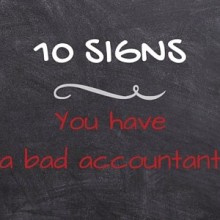
10 Signs that you have a bad accountant
The relationship between business owner and accountant is core to the success and profitability of your business. Ask yourself if your accountant: 1. Has relevant qualification and is up to date 2. Has work experience in UK professional firms 3. Is register under Money Laundering Regulation (MLR) and holds certificate from HMRC 4. Is covered by Professional Indemnity Insurance 5. Truly understands a business and provides the support 6. Works with you to grow your business for the future 7. Helps you to save tax 8. Is approachable, friendly and provides jargon free advice 9. Does not miss HMRC or Companies House deadlines 10. Is really trustworthy If you can answer yes to all 10 statements, we are genuinely pleased for you. If you cannot answer yes to all 10 statements, it’s maybe a time to consider switching accountant. Switch Accountant Now You might be wondering what is the benefit of switching accountant. We can certainly make sure you’re not paying too much tax, so you’re saving already - but there’s so much more we can do together. We’re here to give you business and financial guidance, support and encouragement whenever you need it. The process of switching is simple and we can provide everything you need to ensure the smooth running of your business as well as helping you to maximise business grow, achieving your goals and plan for your future. Switch Accountant Now We have special service packages for companies. Contact us and we will send you our offers to your email. TweetEmail
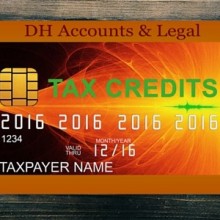
Working Tax Credit – Extra money for people in work on a low income in UK
Working Tax Credit (WTC) is a state benefit in the United Kingdom paid by HMRC to support people who are working and on a low income. It does not matter whether you are an employee or self-employed. In addition, people may also be entitled to Child Tax Credit (CTC) if they are responsible for any children. The basic amount of WTC is up to £1,960 a year - could get more (or less) depending on circumstances and income. Do not miss opportunity to top up your income. Who can get You can get WTC if you or your partner are working enough hours a week and your income is low enough. Also you must be living in the UK. If you are from abroad, WCT depends on your immigration status. You can’t claim tax credits and Universal Credit at the same time. WTC depends on many factors: Age. You must be 16 or over. You must be 25 or over if you don’t have children or you don’t have a disability. Hours a week. You must work a certain number of hours a week. Circumstance Hours a week Aged 25 to 59 At least 30 hours Aged 60 or over At least 16 hours Disabled At least 16 hours Single with 1 or more children At least 16 hours Couple with 1 or more children Usually, at least 24 hours between you (with 1 of you working at least 16 hours) Income. There’s no set limit for income because it depends on your circumstances (and those of your partner). For example, maximum household income in 2016-17 (excluding disability element and childcare and the annual income is before tax and National Insurance are taken off): Number of kids Maximum income in 2016-17 None, single £13,000 None, couple £18,000 One £25,000 Two £35,000 Three £40,000 How much will you get The maximum WTC you can get is calculated by adding together different elements which are based on your circumstances. Elements Maximum amount paid in 2016-17 Basic element – one per single claimant or couple £1,960 Couples’ and lone parents’ element (paid in addition to the basic element but only one Couples’ element allowed per couple £2,010 30 hour element (paid if you work 30 hours or more per week but only one element allowed per couple) £810 Disabled worker element. (a couple can receive two elements if both claimants are eligible) £2,970 Severe disability element (a couple can receive two elements if both claimants are eligible). £1,275 Childcare element, childcare for one child £175 a week Childcare element, childcare for two or more children £300 a week More information you can find on the GOV.UK. Do not hesitate to contact us if you believe you are entitled to WTC. We can also help with other benefits. Tax Credits Form TweetEmail

Tax Refund: How you can spot and protect yourself from scammers
Tax refund scam In this time of the year thousands of taxpayers have been targeted by fraudsters trying to use fake emails or text messages, that they look like come from HMRC, to access people’s online tax records. People receiving emails or text messages are told that they are due a tax refund / rebate but direct them to a fake website that ask to enter login details, bank details, reply to text messages, download attachments. It can be difficult to tell the difference between a genuine offer and a tax refund scam email or text message, so here are some tips to help you. How you can spot and protect yourself About emails and text messages Here’s a text message one of our customer received: You have an unclaimed tax refund. Claim now. [link removed] HMRC will never use texts or emails to tell you about a tax rebate or penalty or ask for personal or payment information, so this is obviously bogus. Don’t give out private information or click any links. A selection of scam email addresses used to distribute the tax rebate emails can be seen below: [email protected] [email protected] [email protected] [email protected] [email protected] [email protected] [email protected] [email protected] taxrefund [email protected] [email protected] refund [email protected] [email protected] [email protected] [email protected] [email protected] [email protected] [email protected] [email protected] [email protected] How to tell if an email is fraudulent Address. Look out for a sender’s email address that is similar to, but not the same as, HMRC’s email addresses. Fraudsters often have email accounts with HMRC or revenue names in them (for example ‘@hmrc.org.uk’). These email addresses are used to mislead you. Information. HMRC won’t ever send notification of a tax rebate via email or ask taxpayers to disclose personal or payment information via email. Action. Fraudsters ask for immediate action. Be wary of emails containing phrases like ‘you only have 3 days to reply’ or ‘urgent action required’. Websites. Fraudsters often include links to webpages that look like the homepage of the HMRC website. This is to trick you into disclosing personal/confidential information. Greeting. Use of generic greeting such as ‘Dear Customer’ and not your own name is something to watch out for. Attachments. Be cautious of attachments as these could contain viruses designed to steal your personal information. If you receive an email claiming to be from HMRC which offers a tax rebate, please send it to [email protected] and then delete it permanently or report here. Other things to consider Logo. The HMRC name and logo is protected by crown copyright. The majority of tax agents comply with HMRC’s requirements for advertising but there are firms who advertise their services or website by using the HMRC logo. If HMRC becomes aware of misleading claims or advertising, the department will take legal action. Tax agent. Tax agent or adviser must register with HMRC and have an agent code or reference number. To appoint an agent to deal with your tax, ask them to use HMRC’s online authorisation service or complete form 64-8 and send it to HMRC. Accountancy service providers. Auditors, accountants, bookkeepers and tax advisers have to register with HMRC under the Money Laundering Regulation and hold certificate. They are committing an offence if they carry on a business and they are not registered with HMRC. Check firms with who you are dealing or looking to deal and if you think they look untrustworthy, act immediately before you have been deceived. Finally, if you are already our customer and claimed a tax refund, you won’t get another one until next year. If you received an email or text message or you are victim of this crime and need help, please contact us on 07753100494 or email to [email protected] Fill out the Tax Refund Claim Form and we will give you free refund estimate. Tax Refund Claim Form If you are one of the millions of taxpayers in the UK that is entitled to a tax refund, then we will ensure that we obtain the maximum refund that you are due. TweetEmail

Virgin Media Business Voom 2016
VOOM 2016 We are Pitching in #VOOM 2016 and and we would like it if you could support us. Please Vote For Us What is #VOOM This is a chance to pitch to Richard Branson and win a share of £1 million (€1.2 million) in prizes - as well as a trip to Necker Island and mentoring at 10 Downing Street. Plus, a whole raft of money-can’t-buy opportunities. Over 14 weeks, the competition will include a huge public vote, a 29-hour Pitchathon (a Guinness World Records attempt, in fact), and a series of competitive face-to-face workshops. Plus, of course, a big finale featuring Richard. Why are we pitching We love working with start-ups and helping businesses to succeed and enjoy the fruitage of their hands. (Our happy clients) We need help to reach those who have a great ideas but lack the knowledge in business or simply need support so they can focus on what they really love to do. Therefore we need to invest to advertising. The business is carried out from home at the moment. Our clientele is steadily growing and we also need business premises and to employ extra staff. Your vote is very valuable. Please support us. Please Vote For Us TweetEmail

Tax Refund: Employees get a maximum rebate!
If you are an employee in the UK you may be eligible to get a tax refund for example if: you didn’t work a full tax year you were made redundant your tax code was wrong You may be able to claim tax relief if you had to use your own money for travel or things that you must buy for your job and employer hasn’t reimbursed all your expenses for example: uniforms, work clothing and tools business mileage and fuel costs travel and overnight expenses working at home buying equipments You can find more information about expenses for employees on the GOV.UK Fill out the Tax Refund Form and we will give you free refund estimate. Tax Refund Form If you are one of the millions of taxpayers in the UK that is entitled to a tax refund, then we will ensure that we obtain the maximum refund that you are due. Follow us on Facebook to find more tips in business, accounting, tax and legal. Also you can get our articles for free directly to your email inbox. Please sign up form below. TweetEmail
Self-Employed: Expenses - How to reduce your tax bill
If you’re self-employed, your business will have various running costs and expenses. You can take these costs away from your business income to work out the taxable profit. Claim all business expenses and capital allowances and you can reduce your taxable profit. Self-employed: Allowable expenses Office costs: stationery and postage; phone, mobile, internet, email and fax bills; printing, printer ink, cartridges and other small office equipment costs; computer software; rent, business and waters rates, utility bills and insurance costs. Travel costs: vehicle insurance, repairs and servicing, fuel, parking, hire charges, vehicle licence fees, membership, breakdown cover; train, bus, air and taxi fares; hotel room costs and meals on overnight business trips. Clothing expenses:uniforms; protective clothing needed for your work; costumes for actors or entertainers. Staff expenses: salaries, bonuses, pensions, benefits for staff or employees; agency fees; subcontract labour costs; employer’s National Insurance. Cost of goods: goods bought for re-sale (stock); goods used in providing services; direct cost of producing goods; cost of raw materials used. Financial costs: accountants, solicitors, insurances, surveyors and architects; professional indemnity insurance premiums; insurance policies; bank, credit card and other financial charges; hire purchase interest and leasing payments. Marketing costs: advertising in newspapers, directories etc; bulk mail advertising; website costs; trade or professional journals; trade body or professional organisation membership. Self-employed: Simplified expenses Simplified expenses are a way of calculating some of your business expenses using flat rates instead of working out your actual business costs. You don’t have to use simplified expenses. You can decide if it suits your business. You can use flat rates for: vehicles business mileage hours working from home people living in business premises Self-employed: Capital allowances Capital allowance are commonly claimed on items that you might use in your business over several years. You can claim capital allowances: plant and machinery – cars, vans, computers, tools fixture and fittings – shelves, furniture, fittings Self-employed: How to claim expenses and allowances Business expenses Add up all your allowable expenses for the tax year and put the total amount on your Tax Return. Business expenses are only allowed in your accounts if they relate to that accounting period. Capital allowances If you want to deduct capital from your profit, you have to work out the value of your item. When you buy assets you can usually deduct the full value from your profits before tax using annual investment allowance (AIA). Business and private use expenses If you use something for both business and personal reasons, you can only claim allowable expenses for all business related expenses incurred wholly and exclusively for your business. In this case you’ll need to find a reasonable method of dividing your costs. Business records You must keep records of your business income and expenses for your tax return for at least 5 years after the 31 January submission deadline of the relevant tax year. Types of proof include: all receipts for goods and stock bank statements, chequebook stubs sales invoices, till rolls and bank slips You can find more information about expenses for self-employed on the GOV.UK To make your life easier we have created a spreadsheet for you. It will give you income and expenditure totals for each month and for each category, as well as overall totals for the year. This spreadsheet is very simple and will help you keeping business financial records. Download Need assistance with completing your tax return, please contact us and our dedicated team will be happy to help. Contact us TweetEmail
Tax Return: Who needs to complete
Self Assessment Tax Return The tax year in UK is from 6 April to 5 April the following year. Self Assessment is a system HM Revenue and Customs (HMRC) uses to collect Income Tax. Tax is usually deducted automatically from wages, pensions and savings. People and businesses with other income must report it in a tax return. Who must send a tax return You’ll need to send a tax return if, in the last tax year: you were self-employed even though the tax due may in fact be ‘nil’ you were a company director you got dividends from shares you had income from abroad that you needed to pay tax on you lived abroad and had a UK income you got £2,500 or more from renting out a property your savings or investment income was £10,000 or more before tax you made profits from selling things like shares, a second home or other chargeable assets and need to pay Capital Gains Tax your income (or your partner’s) was over £50,000 and one of you claimed Child Benefit you had a P800 from HMRC saying you didn’t pay enough tax last year Deadlines HMRC must receive your tax return and any money you owe by the deadline. paper tax returns send by midnight 31 October 2016 online tax returns send by midnight 31 January 2017 pay the tax you owe by midnight 31 January 2017 You’ll usually pay a penalty if you’re late. Do it early and have peace of mind! If you need help with your tax return, contact us and our dedicated team will be happy to help. Tax Return Check if you need to fill in a Self Assessment tax return on the GOV.UK Follow us on Facebook to find more tips in business, accounting, tax and legal. Also you can get our articles for free directly to your email inbox. Please sign up form below. TweetEmail

10 Changes from April 2016 which may affect you
1. The National Minimum Wage will be increased to £7.20 per hour for those 25 or over. 2. The Personal Tax Allowance, the amount you can earn before paying income tax, will be increased from £10,600 to £11,000. 3. The Higher Rate Threshold will increase from £42,385 to £43,000. 4. The Employment Allowance will increase from £2,000 to £3,000. 5. To make it cheaper to employ young people, from April 2016 employers will not have to pay National Insurance contributions (NICs) for all but the highest earning apprentices aged under 25. 6. The new State Pension will be increased £119.30 from to £155.65 per week. 7. The income rise disregard in Tax Credit will be reduced from £5,000 to £2,500. 8. From April, the UK Government will be changing the Construction Industry Scheme (CIS) legislation for contractors and subcontractors. The CIS returns to be filed online only. 9. The Capital Gain Tax rates will be cut from 6 April 2016, but residential property will still be taxed at current rates. The higher rate of Capital Gains Tax will be cut from 28% to 20% and the basic rate from 18% to 10%. 10. The Dividend Tax credit will be replaced by a new £5,000 tax-free dividend allowance for all taxpayers. More information you can find on the GOV.UK TweetEmail
